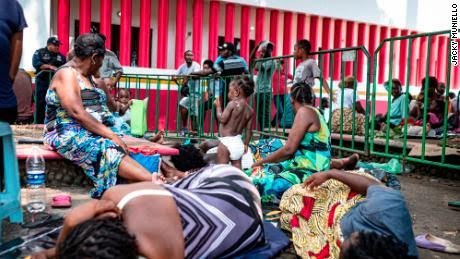
Hundreds of African migrants have camped out in front of the Siglo XXI immigration facility in Tapachula, Mexico, to protest their inability to legally leave Mexico.

Sani, a Muslim man from Ghana and a member of the LGBTQ community, said that he fled his home country after his partner was stoned to death and his house was burned to the ground with his mother inside. “My final destination is Canada,” he explained.
Sani said he preferred to request asylum in Canada because he felt that the US, given President Donald Trump’s actions, would not treat someone who was both a member of the LGBTQ community and a Muslim with justice and equality. (Because many migrants were worried about their safety and protecting their identity as they go through the asylum process those interviewed agreed to be identified by their first names only.)
For so long, both the US and Canada have been mothers to exiles and offered a home to those persecuted for their faith or their identity, to those fleeing injustice and the threat of death. But every time the Trump administration exercises its power to attack a new group of people — the LGBTQ community, migrants — those actions damage our global standing and put in peril justice for all. Members of the US Congress should urge Trump to work with Mexican President Andrés Manuel López-Obrador to create a binational solution for African migrants fleeing persecution so that their lives don’t become yet another casualty of our racist immigration policies.
In May, Trump threatened tariffs on Mexican goods to pressure López-Obrador to decrease migration through Mexico. And in June, African and Haitian migrants who requested the exit permitthat would allow them to travel through Mexico legally and eventually cross the border encountered immigration officials who neither processed their request nor provided an explanation as to why they could not get an exit permit. In their current situation, they claim they cannot legally leave Tapachula and are thus trapped in the city with no promise of housing, food or work permits — a situation that has forced them to live in the street. And now hundreds of Africans can neither travel to the US or Canada to request asylum nor return to their home countries legally.
(snip)
Where the US is failing to lead — on issues ranging from respecting the human rights of migrants to discriminatory treatment of the LGBTQ community in the US — Canada is continuing to lead. For example, in August, Trump announced a new policy allowing the indefinite detention of migrant children, and he proposed a rule to allow federally-contracted businesses “organized for a religious purpose” to discriminate based on LGBTQ status. Although Canada’s migrant detention system is far from perfect, news of the death of immigrant children in US detention centers and family separation via Trump’s policies has had an impact on citizens of other countries. And many African migrants trapped in Mexico believe that the nation that will offer them justice and equality is now Canada — not the US.
Many of the migrants have already faced a long and dangerous journey. Fleeing violent ethnic conflicts in their home countries, many flew into Brazil or Ecuador and then took buses or walked part of the way through Central America. According to some of the migrants I spoke with, the trip costs roughly $4,500 per person.
For those now forced to live in tents in Tapachula, life is challenging. Each day at sunrise, Brown, 30, from Cameroon, wakes up among dozens of African migrants as they leave their tents, gather firewood, and prepare to cook food on the street in front of Siglo XXI in Tapachula. Siglo XXI serves as both a detention center and a point for processing immigration paperwork. Not surprisingly, in recent weeks, it has also been a gathering point for African migrants protesting a recent crackdown on migration.
On a recent day, in the brutal midday heat, the migrants bathed their children in plastic buckets as the Mexican National Guard watched silently. As part of López-Obrador’s agreement with Trump to decrease the number of migrants crossing from Mexico into the US, he sent some 6,000 National Guard troopsto the Guatemala border.
(snip)
The agency confirmed migrants protesting outside the facility require a permit to travel through Mexico, but said officials had approached migrants to review their cases but that “they refused to receive help,” according to a statement released on Tuesday.
Brown fled a situation in Cameroon in which government forces were battling separatist groups and in the process killing civilians indiscriminately. He pulled his cell phone out of his pocket to show me a video of the dead bodies of people in his village, people who had clearly been killed while running for their lives, the terror still visible on their faces. I had to look away. Then he said, “Trump is a crazy president. He don’t care for human beings. He care for himself.” While the African migrants do blame the Mexican immigration officials for their situation, they see Trump’s tariff threats against Mexico as the origin of the changes in processing the exit permit.
Martha, 43, from Angola, showed me the small green tent where she, her seven children and her husband had been living for the past month and a half. Martha, like so many other African migrants, said they hoped to request asylum in Canada because she felt it was a safer country for a family than the US.
This is the new perception that many migrants now have of the US — and it’s a dangerous one. The world is clearly watching the way the Trump administration treats Muslims, immigrants, women and the LGBTQ community, and our history as a country that offers justice and equality to all is quickly eroding. Unless Trump and López-Obrador come together to find a plan to help African migrants seeking asylum, lives will continue to hang in the balance.
*see full story by CNN